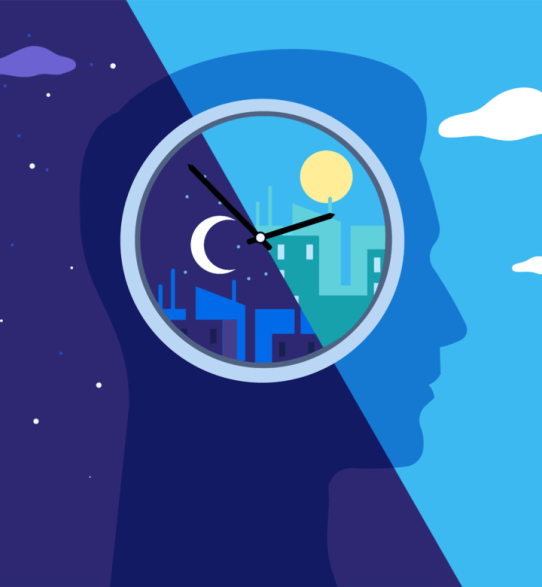
On Sunday, Americans will usher in daylight saving time, turning their clocks one hour ahead. Shifting clocks can leave many of us so sleep deprived the day after that experts have dubbed it “Sleepy Monday.”
Aric Prather, PhD, director of UC San Francisco’s Behavioral Sleep Medicine Research Program and professor of psychiatry and behavioral sciences, specializes in treating people with sleep disorders, largely insomnia and and circadian rhythm disorders.
We asked Prather what happens when we miss Zzz’s – and just how badly springing forward sets our sleep back, temporarily.
How does a lack of sleep affect our health?
A lack of sleep is associated with a host of health issues, like an increased risk of cardiovascular events, like high blood pressure and heart disease, weight gain and a weakened immune system – making you more vulnerable to infectious diseases. Recently, there’s been more data suggesting a link with insufficient sleep and neurodegenerative diseases.
Is poor sleep bad for our mental health?
Yes. Pretty much every psychiatric condition has some level of sleep disturbance associated with it, but a lack of sleep is most commonly linked to an increased risk for depression and anxiety disorders.
How much sleep do you need based on your age?
| AGE | SLEEP NEEDED |
|---|---|
| 4–12 months | 12–16 hours/day |
| 1–2 years | 11–14 hours/day |
| 3–5 years | 8–10 hours/day |
| 6–12 years | 9–12 hours/day |
| 13–18 years | 8–10 hours/day |
| 18 years and older | 7–8 hours/day |
Why do our bedtimes and wake times matter?
About one-third of adults don’t get enough sleep but there’s growing evidence that sleep regularity may be as important or even more important than sleep duration, in some cases.
Sleep regularity is how consistent you can be with your bedtimes and wake-up time. A recent study reviewed data from more than 60,000 sleepers in the United Kingdom. The research found that high sleep regularity was associated with at least a 20% reduction in mortality. This was independent of the amount of sleep that people were getting and emphasizes the importance of our circadian rhythm, or our internal clock that helps keep us awake during the day and sleep at night.
Does daylight saving time actually affect our sleep?
Yes. Losing an hour of sleep certainly makes everybody a little bit cranky and it can have real world consequences.
The Monday after daylight saving time kicks in is actually known as “Sleepy Monday.” Many people can probably relate to feeling groggy the next morning but it carries some real risks: There’s about a 6% increase in fatal car accidents, data also suggests increases in hospital admissions for conditions like heart attacks and atrial fibrillation, or a-fib. Judges have even been shown to dole out harsher sentences on “Sleepy Monday,” compared to the preceding Monday.
What are some tips for preparing for daylight saving time?
- Adjust your schedule the week before by waking up 15 to 20 minutes earlier for a few days prior to the change.
- When you wake up, make sure to get some sunlight into your eyes, which helps retrain your circadian clock and will make waking up a little easier.
- Get a good night’s rest on the Saturday night before daylight saving time starts by really protecting that bedtime routine. Make sure you plan a strong wind-down routine to get good restorative restful sleep in anticipation of the change.
- Take precautions: Know that you might be groggy on Sleepy Monday so, if you can, take that into account when planning trips that might mean long drives or projects that might require using heavy equipment, for example.
About UCSF Psychiatry and Behavioral Sciences
The UCSF Department of Psychiatry and Behavioral Sciences and the Langley Porter Psychiatric Institute are among the nation's foremost resources in the fields of child, adolescent, adult, and geriatric mental health. Together they constitute one of the largest departments in the UCSF School of Medicine and the UCSF Weill Institute for Neurosciences, with a mission focused on research (basic, translational, clinical), teaching, patient care, and public service.
UCSF Psychiatry and Behavioral Sciences conducts its clinical, educational, and research efforts at a variety of locations in Northern California, including the UCSF Nancy Friend Pritzker Psychiatry Building; UCSF Langley Porter Psychiatric Hospital; UCSF Medical Centers at Parnassus Heights, Mission Bay, and Mount Zion; UCSF Benioff Children’s Hospitals in San Francisco and Oakland; Zuckerberg San Francisco General Hospital and Trauma Center; the San Francisco VA Health Care System; UCSF Fresno; and numerous community-based sites around the San Francisco Bay Area.
About the UCSF Weill Institute for Neurosciences
The UCSF Weill Institute for Neurosciences, established by the extraordinary generosity of Joan and Sanford I. "Sandy" Weill, brings together world-class researchers with top-ranked physicians to solve some of the most complex challenges in the human brain.
The UCSF Weill Institute leverages UCSF’s unrivaled bench-to-bedside excellence in the neurosciences. It unites three UCSF departments—Psychiatry and Behavioral Sciences, Neurology, and Neurological Surgery—that are highly esteemed for both patient care and research, as well as the Neuroscience Graduate Program, a cross-disciplinary alliance of nearly 100 UCSF faculty members from 15 basic-science departments, as well as the UCSF Institute for Neurodegenerative Diseases, a multidisciplinary research center focused on finding effective treatments for Alzheimer’s disease, frontotemporal dementia, Parkinson’s disease, and other neurodegenerative disorders.
About UCSF
The University of California, San Francisco (UCSF) is exclusively focused on the health sciences and is dedicated to promoting health worldwide through advanced biomedical research, graduate-level education in the life sciences and health professions, and excellence in patient care. UCSF Health, which serves as UCSF’s primary academic medical center, includes top-ranked specialty hospitals and other clinical programs, and has affiliations throughout the Bay Area.





